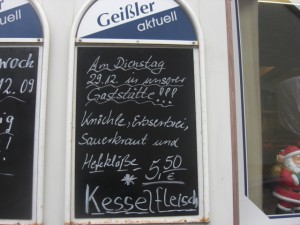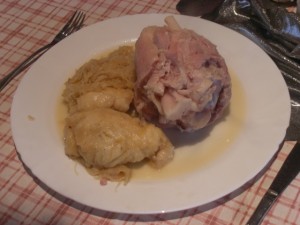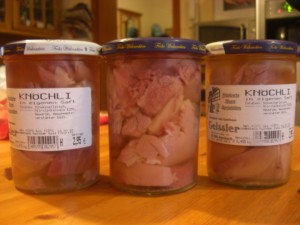Whenever I tell folks I am originally from Franconia (Northern Bavaria), also known as the land of the Beutebayern, I get a lot of different reactions. Some find our singsong talk quaint, others relate the stubbornness they experienced with Franconians, and yet others rave about its cuisine. Today’s post is about Knöchle (pork knuckles), one of the most popular dishes Franconians like to eat around the holidays, whether on Christmas Eve or New Year’s Eve.
For Christmas Eve dinner, I had tried to order Knöchle from our local supermarket right here in the state of Hesse. Pork knuckles had always been known to me as Knöchle in the Franconian dialect, and only by the time I made it to the Hessian meat counter to place my order did it dawn on me that the Franconian term Knöchle might not be understood.
Well, the clerk had to ask a coworker and boss to see if anyone knew what Knöchle were, but nobody spoke Fränkisch there. I did not know the proper German term for this delicacy either and so I had to go home and call my sister in Franconia. Then I learned I should have ordered Eisbein and I felt a bit foolish then.
Eisbein – a rather North German version is cured (salted) and cooked, while the Schweinshaxe, the more southern German version is grilled. The Eisbein is generally served with Sauerkraut and yeast dumplings.
As soon as I knew the term Eisbein, I went back to the supermarket to place my order. Then I was told it was too late to fill my order in time for Christmas Eve. For something exotic as such, I would have to allow a few working days.

Tuesday Special: Pork knuckles, mashed peas, Sauerkraut and yeast dumplings for € 5,50
So when we spent the last few days in Franconia, we passed by our local village’s meat shop and guesthouse, and there we had it: Knöchli advertised as Special of the Day!
If you ever happen to be in the area of Schweinfurt, more specifically Hambach in Lower Franconia, then stop by the guesthouse:
Gasthaus und Metzgerei Geißler Hauptstraße 41 97456 Dittelbrunn-Hambach Tel.: 09725 4471. (Call for a reservation on Sundays and holidays)

Knöchle with Sauerkraut and yeast dumplings

A close-up of this humongous Knöchle

Knöchli in a jar
After lunch, we also got Knöchle in a jar from their meat shop next door. Guess you could say we went a bit Knöchle-crazy there… but we also felt lucky, blessed, a bit overeaten, and somewhat nostalgic.
Guess what’s on our menu for New Year’s Day? Yes, Knöchli, mashed potatoes and Sauerkraut. Especially the latter one is an important item on any New Year’s Days menu, especially in Franconia, as eating Sauerkraut will ensure your good fortune for the coming year.
Last, but not least. Have you noticed that the guesthouse advertised its special with Knöchle and the adjacent meat shop calls them Knöchli? Both forms are correct.




I remembered that Japanese people eat noodle soup (toshi koshi soba) at New Year’s Eve. I had better eat that? Then I have to order my hostfamily this hope. But it is too late as well. Maybe. Sadamichi
I never knew – or maybe forgot – that the Japanese eat toshi koshi soba on New Year’s Eve.
From the three years I had spent in Japan, I only remember being served kuromame (black beans) for good fortune on New Year’s Day. We were told eating black beans will ensure money coming in throughout the year.
Sadamichi, aren’t there any shops nearby which sell instant toshi koshi soba in London? You should give it a try!!
You mean “Osechi ryouri”. Japanese eat this dishes during New Year’s three days. And you are right. I thought I should buy cup noodle here.For the purpose, I will go out and eat at home. Or I will have a lunch at Chinese restaurant. Do you know why Japanese eat toshi koshi soba today. Yoi otoshi wo. Sadamichi
Now I am curious – what is the significance of eating toshi koshi soba on New Year’s Eve?
For that matter, I should find out more why some Franconians eat Sauerkraut (fermented cabbage) for good luck.
よいお年を!
A answer is easy. That means that we eat long noodles and then we will live long as well. At 14:50 (London), 15:30 (German) and 23:50, I started to eat chinese noodle. About 15:10, 16:30, so at 0:10 New Year, I finshed my lunch. While eating noodle, I have got a New Year. Exactly, it is “Toshi koshi” plus soba.
I have to correct my writing. 15:50 (German), and 16 :10 (German)are correct.
All I could find why Germans eat Sauerkraut on New Year’s Day is from wiki recipe:
http://www.rezeptewiki.org/wiki/Sauerkraut_zum_Neujahr
Again, the only mention is eating Sauerkraut means money coming in for the year.
Ha, ha,ha….It suits me very well. I miss german Sauerkraft!!!At last, english potato chips are enough. I wish I could use the kitchen here. Hopefully, my girlfriend eats Sauerkraft today. But she is Russian German. At 7 p.m (London), 8 p.m. (German time), I will have a dinner. I am very curious now!
A Happy Happy New Year!!! It is wonderful in London! Very sunny!!!Like that, my new Year has started and has been opened with a lot of joy and success. My horizon will be wider and wider. Now, my window is opened as well. Yesterday’s dinner was Ton Katsu. As that says, my first day of new year is THE victory. Enjoy your Happy New Day!!!
Nelson Müller (Fernsehkoch) hat erwähnt, dass die beste Blutwurst, die er kennt, von seinem Bruder ist, der eine Metzgerei in Hambach hat. Da ich da manchmal vorbeikomme wenn ich meine Geschwister in Rannungen besuche, habe ich nach der Metzgerei gesucht. Dabei bin ich auf diese schöne Webseite gekommen. Ich glaube, außer der Blutwurst nehme ich auch noch ein Knöchle mit (Knöchli sagt in Rannungen niemand).
Grüße nach Franken und ä g’scheite Hambacher Blutwurst könnte ich auch schon wieder vertragen!